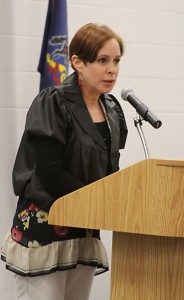
DUBOIS – Alina Fernandez, daughter of Fidel Castro, spoke in the Hiller Auditorium Thursday night at the Penn State DuBois campus about her life. Fernandez spoke of being just old enough to remember life prior the fall of Batista and young enough to remember the night Castro took power as the night “Mickey Mouse and Uncle Scrooge vanished forever.” Fernandez escaped to the United States in 1993 bringing her daughter with her.
The talk, one of the first events of the Performing Arts and Lecture Series, covered the changes she witnessed in her country as she grew up and some of her life as a daughter of the former ruler of Cuba. She joked on occasion, opening up the evening saying that she had been lied to in regards to the bottle of water she had at the podium, “… I was expecting Vodka”
Fernandez was born after her mother’s husband fled during the revolution to the United States and after Castro’s wife divorced him while he was imprisoned for his role in the assault on the Moncada Barracks. During his imprisonment he was writing love letters to both his wife and Fernandez’s mother. Fernandez stated that the guards, while inspecting mail. either on purpose or by accident, switched which letter went to which envelope, revealing the affair.
Fernandez recalled the early days of Castro rule as initially jubilant. The atmosphere began to change as time went on.
“You could see Cubans trade their former laughter for destructive tendency,” said Fernandez.
Christmas ceased to be celebrated, though it would eventually return. Flavored ice cream was no longer served. Private fences and parking meters were destroyed as signs of oppression. Optimistic shouts regarding the revolution becoming shouts of “to the wall.” It would be a few years before she was old enough to realize she had witnessed executions.
When the middle class and specialists attempted to leave Castro’s Cuba, travel was banned. Religion, freedom of press and freedom expression soon followed. Dancers, artists and homosexuals were relocated to “military units to help the effort.”
“The child is able to adapt gloriously to anything,” said Fernandez.
As a child she originally knew Castro as top of the “hairy men,” the revolutionaries, who made the jump from television into her living room. This only occurred at nights. The visits cheered up her mother.
“Only my grandmother called him the devil,” said Fernandez.
When it was revealed Castro was her real father, Fernandez stated she was initially relieved. Until then, growing up under the instated education system, she had been taught in schools people like the man she thought had been her father and her half-sister who left Cuba with him were traitors. Once word spread people began to line up outside her house to give her letters to pass along to her father asking for help.
As Fernandez grew up she joined the dissident movement, as she learned “voluntarily” under her father’s rule often meant “mandatory.” The people begging her to get her father to help them in their need were said to actually be trying to overthrow Castro.
When the United Soviet Socialists Republic fell, Cuba was hit by hard times, according to Fernandez. Food became scarce even under rationing. In her lifetime the country had gone from kids watching cartoons to having electricity for a few hours was considered a good day.
Wanting her daughter to have a good education meant both of them had to leave the country.
Following her presentation, Fernandez took questions from the audiance. In regards to the U.S. embargo, it will end when the Castro family wishes it to end.
“For the Cuban regime it is the best context for the plight of the rural community,” said Fernandez.
She added that “anyone with a head” knew that Cuba had been supported by Russia. When the Soviet Union fell so did that support. She accused the Cuban government of intentionally shooting at aircraft in international waters attempting to give aid to Cuban refugees in 1996 as part of a planned act to turn public opinion in the U.S. against lifting the embargo under President Bill Clinton.
According to Fernandez the country will not improve until the Castro family dies out.
“I think the process is very personalized by the Castro family,” said Fernandez.